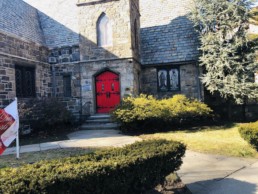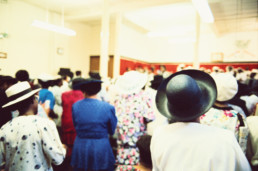'Your Name is Higher Than Covid-19!'
'Your Name is Higher Than Covid-19!'
Kelly Davis | kwd2111@columbia.edu

WICHITA, KS. – Seemingly undaunted by an empty church, the worship leader stands at the altar and belts out gospel classics, enthusiastically encouraging the congregation to clap and sing along. His audience, watching at home on Facebook Live, politely obliges.
This has become standard practice for Sunday services at Heart of Christ, a United Methodist Church, in Wichita. For the last two Sundays, in the midst of the rapid spread of the novel coronavirus across the nation, services have moved exclusively online, shaking up church infrastructure and many other houses of worship along the way.
On March 22, Heart of Christ began streaming services online. The church’s Facebook page shared an announcement from the Great Plains United Methodists, which represents parts of Kansas and Nebraska, citing that they would be following CDC guidelines and moving to a digital platform. The statement also says that despite the fear around COVID-19, specifically around the negative financial impact that the virus has had, the bible tells us to “fear not.”
The head pastor of Heart of Christ, the Rev. Ronda Kingwood, put out her own statement, encouraging the church that although the congregation would not be meeting inside church walls, ministry would still continue.
“We will be ministering to our elderly, our single parents, the nursing homes in our community and others that may need help in this time,” Kingwood wrote on March 20.
On March 29, after the worship leader finished his song, Kingwood’s sermon from the church sanctuary seemed fitting for the times. She started off her message with a prayer, encouraging viewers that God is doing a great thing in the midst of the chaos and turmoil in the world. With her emphatic voice, Kingwood said that the origins of the pandemic came straight from the pits of hell and pleaded the blood of Jesus over the virus.
“Your name is higher than Covid-19!” Kingwood proclaimed.
She lifted up in prayer healthcare workers across the globe on the front lines fighting the virus, as well as those suffering from physical ailments.
“Let healing flow through hospital hallways,” Kingwood pleaded.
She prayed that the families of the sick would be strong in this time and asked that people would use common sense to practice social distancing and take the CDC guidelines seriously. She ended the prayer by giving glory and praise to God in the midst of it all.
Kingwood then jumped into the book of Ezekiel, citing the passage in chapter 37 where God brings Ezekiel to the valley of dry bones. Despite the death and decay all around him, Ezekiel still remembers that God is sovereign and that He can “breathe life into these dry bones.” Kingwood related this scripture back to what is happening across the world today. She reminded her congregation that although it may seem like we are all in a dark valley of anxiousness and uncertainty of the future, God’s people should use Ezekiel as an example that He can turn around any situation, no matter how bleak it seems.
Just like Ezekiel, God is showing us that He got this thing,” Kingwood declared. “God can use any situation and then turn it around. There is nothing impossible for our God.”
Sometimes the Body of Christ is a Chocolate Chip Pancake
Sometimes the Body of Christ is a Chocolate Chip Pancake
Madeline Simpson | mms2331@columbia.edu

Associate Pastor David Gungor opens Trinity Grace Church’s service with worship songs. He plays an acoustic guitar, his wife plays the violin, and three other people sing harmony. They all stand at least six feet apart from each other.
After worship, Pastor Michael Rudzena enters the stage and gives a sermon about the biblical character Lazarus, who Jesus raised from the dead. Rudzena speaks of Jesus’ intellectual depth, his emotional intelligence and his hopeful courage as he learns about and mourns his friend’s death. Rudzena addresses an empty chapel.
The service flows from sermon to Eucharist, the Christian tradition of eating bread and drinking wine to honor Jesus’ body and blood. On a typical Sunday, the congregation would approach the front of the church to receive Eucharist from the pastor or church member.
But I know that today is different. I am not in Good Shepherd Chapel, where Trinity Grace holds service—I’m in my parent’s living room in White Bear Lake, Minnesota, watching Rudzena on a flat-screen TV. Instead of wine and bread, I have coffee and a piece of a chocolate chip pancake.
“Last week we said this is the weirdest Eucharist we’ve ever done,” Rudzena says. “But here we are again. Communion is about our connection to each other. Though we are not in the same room, we are deeply connected, not only by God’s spirit but by our love for each other.”
Trinity Grace is one of thousands of houses of worship in the United States and around the world impacted by the coronavirus. On March 21, the White House issued an ordinance for Americans to avoid gatherings of 10 or more people. Most evangelical church services fall in this category, and churches around the nation scrambled to set up technology that would allow the community to continue to meet.
It is the second Sunday in a row that I am attending “virtual church”—a result of social distancing and the “stay-at-home” orders to protect from the COVID-19 virus. The service is aired live on Trinity Grace’s YouTube channel, with a chat capability where congregants can talk in real-time throughout the sermon. I learn that I am not the only one watching out of town.
“Greetings from Baltimore!”
“Hello from two blocks away in Tribeca!”
“Grace and peace, everybody.”
For my church-going family, spending a Sunday morning at home usually meant a snowstorm had shut roads down. Raised in a conservative evangelical home, I grew up going to church a few times a week, including every Sunday morning. Skipping church was not allowed.
But now, we have no choice. My parents’ local church in Minnesota closed in the same way that the churches in New York did. There is nowhere to go on Sunday mornings except YouTube.
We adjust as the world adjusts.
“Let’s let this table move us towards unity in a time of strife,” Rudzena says, leading the online congregation in the Eucharist liturgy. “Let’s join in prayer, and start with gratitude. The Lord is here. His Spirit is with us... We lift our hearts to the Lord… It is right to give thanks and praise.”
And then, around the country, we eat our chocolate chip pancake, our cracker, our sourdough bread, and drink our wine, our coffee, our juice. We recite, separately but together, “Jesus Christ is holy. Jesus Christ is Lord. To the glory of God the Father. Amen.”
Preaching in the times of Corona
Preaching in the Times of Corona
Zoé Chevalier | zc2504@columbia.edu
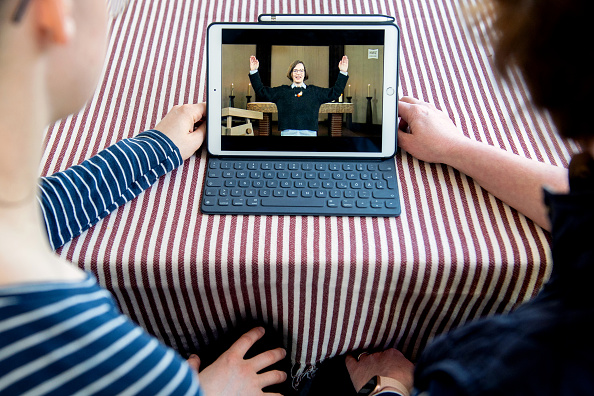
This Sunday is not like any other. There is no singing and dancing, no coming together and hugging at the United Pentecostal Church in Harlem. Instead, Pastor Michael Grattan is alone in his office, preaching on Facebook Live, while comments pour in: “I’m watching from Wisconsin,” says one, many just send “Amen,” another one just says “I made it!”
It was not easy to connect to the Pastor’s sermon this morning. There were technical glitches, and the video stopped in the middle, leaving only a 7-minute segment available. These are the realities of preaching in the times of Corona.
The Church on 125th closed its doors on March 22nd for Sunday services but remains open for weekly prayer and Bible study on Wednesdays and Fridays. There, the few congregants sit on different benches and avoid getting close to each other.
If Bible study became online, the pastor fears that he would lose the back-and-forth conversations that are at the heart of the experience. He also fears that he will have to simplify his lessons because he thinks it is harder to explain complicated concepts online: “I see these TV evangelists,” he says, “they have 10,000 people in one room, but everything they say is so basic.” Especially now in this time of crisis, Grattan says he wants to focus his next lessons on the book of Revelations. “There is a hunger for it,” he says.
The Book of Revelation is the last book of the Christian Bible, written by an unidentified “John”. According to Pastor Grattan, the book recounts how the Antichrist will come down to earth and tempt humans to follow him, those who do will be stained by the “mark of the beast” and have their soul destroyed. This apocalyptic tale fascinates believers according to Grattan, as all try to find resemblances between the text and modern-day life. The virus is only intensifying a question that Christians have been asking themselves for hundreds of years: “Are we in the end times?”
Grattan’s Sunday sermon focused on a more positive message, one of hope: “Once we overcome the fear of death, we are able to overcome all anxieties in life,” he says on the screen, adding: “If we do what we can, God will do what we cannot.”
The cancellation of Sunday service came as a relief to some according to Iris Grattan, the daughter of the pastor. She says that worshippers were worried about sinning by not going to Church to protect themselves from the virus. “[They thought] am I being fearful and not believing in God? Iris says.
Grattan worries about his ability to connect with less technically-savvy members of the community, like those who do not have access to Facebook. Some older members have only an old flip phone, others do not even have a cellphone. Grattan tries to stay connected with them through texting and calling, but he does not know how he will keep the connection strong in the future. “I don’t have answers yet,” he says, “I have never been faced with this before.”
Blessed are the Top 10
Blessed are the Top 10
Kelly Davis | kwd2111@columbia.edu
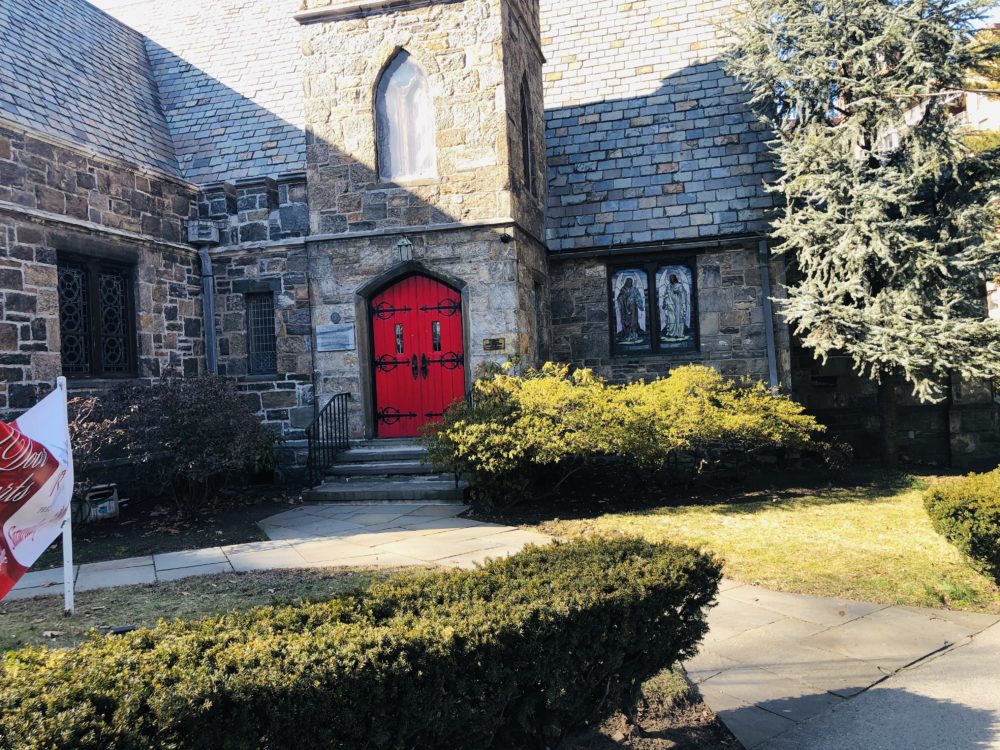
It’s Oscar Sunday, and in a Gothic-style church in the Riverdale neighborhood of the Bronx, people of all ages and races sit patiently in the quiet sanctuary. Reverend Krystin Granberg rests her arms comfortably on the pulpit as she begins her sermon for the 10:30 a.m. service at Riverdale Presbyterian Church, located at 4765 Henry Hudson Parkway. Her topic is not a Bible verse. Her message is not fire and brimstone.
“I love Oscar Sunday even more than Super bowl Sunday,” Granberg begins. Church-goers respond with a chuckle and the solemn faces in the room seem to be at ease a little bit.
Much to my surprise, Granberg’s message is centered around today’s pop culture. She speaks about the trend of “top 10” lists.
Top 10 movies of 2019
Top 10 vegan restaurants in NYC
Top 10 ways to get fit in the new year
But religion isn’t far behind. “Jesus has a top 10 list, too,” she remarks.
She proceeds to introduce a familiar passage from the bible most commonly known as the beatitudes.
“Blessed are the poor in spirit, for theirs is the kingdom of heaven.”
“Blessed are those who mourn, for they will be comforted.”
“Blessed are the meek, for they shall inherit the earth.”
Matthew 5: 3-5
She compares the beatitudes with the to do lists that modern-day culture sets for us to be successful. Granberg explains that the bible verses and other similar scriptural references are not the top 10 lists like the world gives us, but rather a list of things that have already been done.
When Jesus recites the beatitudes, he is not saying what believers must do in order to be good Christians. Rather, he is explaining what the kingdom of God presents, as gifts, to those who believe in Him and his message of salvation.
Tying her message back to the Oscars, she recalls one of her favorite movies, “Monty Python’s Life of Brian.” While the movie offered her powerful lessons that she still holds today, Brian, the farcical main character, was just as persecuted as Jesus was for spreading the message of salvation. Brian’s struggles in various scenes of the movie reflect Jesus’ own challenges.
Granberg reminds the congregation that they should not ask God what to do to be worthy of His love, instead to know that any shackles of anxiety, fear, depression and worry have already been broken. The kingdom God is about being rather than doing, she says. We are already blessed, and there is nothing more that we need to do to be approved. She adds that the only thing the Lord requires of us is to, in the words of the Prophet Isaiah, do justice, love kindness and walk humbly with the Lord.
She also says that if she had the chance, she would write additional beatitudes and include things like:
Blessed are the truthtellers
Blessed are the caretakers
Blessed are the peacemakers
And above them all: Blessed are the rulebreakers, who advocate for the most destitute of society.
She says that she was perplexed that so many people are confused with what others are not doing. This creates a culture of people that are so anxious about what they are or not doing, they end up projecting their feelings of failure onto others. Referring back to the to do list, Granberg points out that church gives everyone an opportunity to be critical.
As the sermon wears on, she goes back to the phrase of what the bible requires of us: to do justice, love kindness and walk humbly with the Lord. She cites biblical figures that ministered to lepers and preached to them about the love of God.
Closing her sermon, Granberg says that in trying to make a difference in this world, we can start by impacting each and every person we meet. She pleads that in this world of chaos and turmoil, her congregation preaches cheerfulness and radical love.
Silent Tears
Silent Tears
Annick Laurent | acl2220@columbia.edu
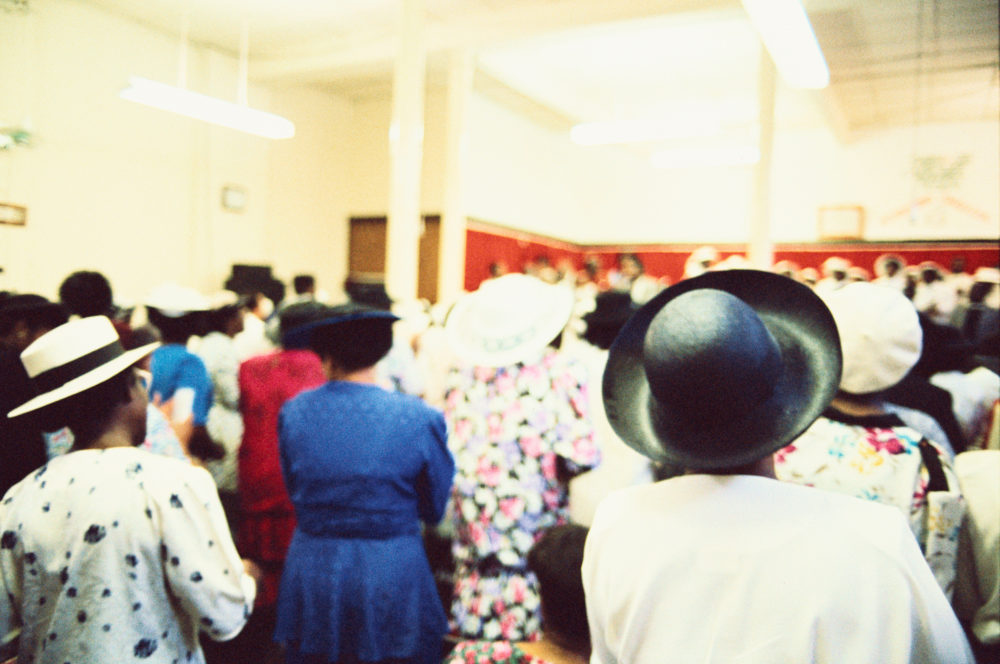
On a recent Sunday morning, the Sanctuary Choir at the Convent Avenue Baptist Church in Harlem sits relatively still, with the exception of those fanning themselves with the day’s programs. There are about 40 choir members, all dressed in bright blue robes with kente cloth embellishments sewn on the shoulders.
On the church floor, white-gloved ushers are guiding late comers across the wine-colored carpet to the few remaining spots in the roughly 1,000-seat church. Above the choir is an arch with the phrase “One Lord, One Faith, One Baptism,” painted on it in all caps.
Seconds later, Dr. Gregory Hopkins, the choir’s director, gives the singers the cue to rise to their feet. A familiar melody fiercely erupts from the organ. It is “Lift Every Voice and Sing” and it is sung by the choir with palpable pride to commemorate Black History Month and honor the souls of ancestors who fought for freedom.
The instrumental version of the first line plays once:
“Lift every voice and singgggg...”
Ed Broms, the organist, held on the note for “sing” in the opening line with a key on his left hand as his other one fluidly moves through the right side with ease. Light flute-like notes flutter in the air with quick succession, layered the deep “sing.”
Broms repeats the opening phrase a few more times, going higher on the scale with smooth transitions.
With the grace of a dancer, Hopkins raised his arms with pulsing wing-like motions to the beat of the spiritual. The choir followed his pace.
The first stanza is delivered in staccato fashion:
“Lift every voice and sing
Till earth and heaven ring
Ring with the harmonies of Liberty
Let our rejoicing rise
High as the list'ning skies, let it resound, loud as the rolling sea.”
The tenors and sopranos distinguish themselves in tone and delivery. The women repeat “lift every voice and sing” at the end of each line
“Sing a song full of faith that the dark past has taught us
Sing a song full of the hope that the present has brought us
Facing the rising sun of our new day begun
Let us march on, let us march on, ‘til victory is won”
Originally conceived in 1900 as a poem, “Lift Every Voice and Sing” was penned by James Weldon Johnson, who was a lawyer and high school principal before pursuing a writing career full-time. J. Rosamond Johnson added the music to the ballad five years later, giving its poignant lyrics a vivacious uplifting accompaniment. Their collaboration is often regarded by African Americans as the “Black National Anthem” in addition to being a hymn that calls on God for aid through strife and fatigue.
I am overwhelmed hearing it sung. The choir’s rendition takes me on a winding emotional rollercoaster. The preface is buoyant and encouraging in the first verse before it transforms into something reminiscent of a chant for steadily marching soldiers. It is a musical salute to the foreparents, acknowledgement of sacrifices along a rocky unrelenting treadmill of a path.
Greatly contrasting the thundering start, the next verse is a whisper by comparison.
We have come, we have come over a way
That with tears have been watered
We have come, we have come treading our path
Through the blood of the slaughtered,
Out from the gloomy past,
Where the white gleam of our bright star is cast.
“The slaughtered.” Unfallen tears put pressure on my eyes.
The notes become less divergent, almost meeting in the middle. The tune slows and takes a somber turn, embodying communal mourning.
God of our weary years,
God of our silent tears,
Thou who has by Thy might
Led us into the light,
Keep us forever in the path, we pray.
Lest our feet stray from the places,
Our God, where we met Thee,
Lest, our hearts drunk with the wine
Of the world, we forget Thee;
Shadowed beneath Thy hand,
May we forever stand.
True to our GOD,
True to our native land.”
The choir ended the song in a rich, dragging, reverberating “Amennnn.”




